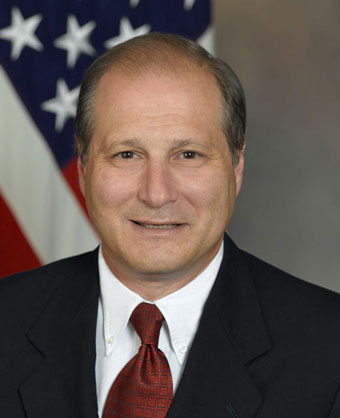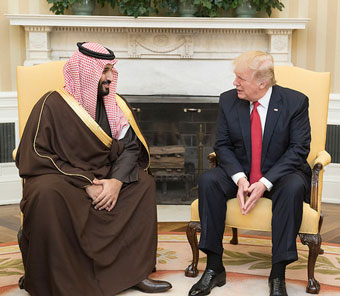Q&A: The murder of Jamal Khashoggi
Miller Center Senior Fellow Eric Edelman foresees an impending crisis in U.S.-Saudi relations
Q: Give us a baseline from which to discuss this. What do you feel that we know at this point?

Edelman: Well, we know that Jamal Khashoggi walked into the Saudi consulate in Istanbul and did not walk out. The Turkish government has said that it has evidence that he was murdered in what appears to be a contract hit by a team of 15 folks dispatched to Istanbul for that precise purpose. For a number of days, the Saudi government denied that anything untoward had happened to Mr. Khashoggi. But over the weekend, they admitted that he was in fact dead. And now they’ve arrested 18 people who they say were involved in his murder, which they allege was not an operation approved by the Saudi government—and in particular, not approved by Crown Prince Mohammed bin Salman.
This is one of a number of very disturbing events that have occurred, and not just in Turkey or Saudi Arabia. You see this with the attempted murder of the Skripals [a former Russian spy and his daughter] and the killing of a British citizen by Russian agents of the GRU, the military intelligence service. You see this in the seizure by Chinese authorities of the head of Interpol without any explanation. I think there is a general sense that, over the last few years, the world has become a little less moored to basic norms and standards of international behavior. And this is just the most recent—and a particularly egregious—example of using a diplomatic facility that's protected by the Vienna Convention, meant to protect the sanctity of diplomatic missions, as a venue for a particularly grizzly political murder.
Q: The Turkish government and the Saudi government both seem to think that journalists who do not perform in the service of the state should be subject to physical force. What did you make of President Erdoğan's statement on October 23?
Edelman: Well, you're certainly right President Erdoğan is no paragon—for the rule of law and, in particular, for free expression and journalistic freedom. Turkey, I think, has more journalists in jail now than any other country in the world, and that's not even on a per capita basis. That's absolute. I think what you have to understand here is that this takes place in the context of a very serious rivalry for leadership in the region and the Arab states. And now inside the world of Sunni Islam, there is a rivalry between Turkey and the Kingdom of Saudi Arabia to see who will be the leading force in Sunni Islam. You have to see both President Erdoğan’s speech today and all the statements that Turkish media have made based on leaks from Turkish intelligence and police sources in that light.
[This could be] a crisis that's perhaps even greater than the one that occurred in the relationship after 9/11, when 19 of the 21 hijackers were revealed to be Saudi citizens.
Q: What is your take on the U.S. response?

Edelman: The main U.S. response obviously has been more focused on the Saudi dimension than the Turkish one. And I think sending Secretary of State Mike Pompeo and CIA Director Gina Haspel to Turkey to try and get as much information as we can from the Turks is appropriate. We have a lot of leaks, but it's not clear how much hard information we have. There have been press reports, for instance, that U.S. intelligence officials have heard an audio tape of the events that took place in the consulate, but that hasn't been confirmed The much bigger question, of course, is what the impact of this is going to be on the U.S.-Saudi relationship, which is an important one, but which I think is now locked in a crisis that's perhaps even greater than the one that occurred in the relationship after 9/11, when 19 of the 21 hijackers were revealed to be Saudi citizens.
Q: In addition to the geopolitical dimensions, what role does a U.S. commitment to human rights play in policy going forward?
Edelman: The United States frequently finds itself trying to balance its interests and its ideals in these kinds of situations. Obviously, it's completely unacceptable to have a U.S. resident murdered in a diplomatic establishment. And we should not allow the Saudi government to believe business as usual can go on under those circumstances. That being said, we do have very important interests there. We’ve got the energy interest. Although the United States is increasingly self-sufficient in energy, we depend on moderate prices and have allies who rely on oil from the region. And of course, we've got a concern about Iranian efforts to dominate the region. All of these considerations have to be balanced against one another.
But I think it is fair to say that for the foreseeable future, with this cloud hanging over the relationship—particularly over the head of Crown Prince Mohammad bin Salman, who is the de facto ruler of the kingdom—this is going to be a relationship in some crisis. I fully expect Congress to take action here. Then there will be other international repercussions and sanctions against some of the Saudis who are involved in this. And if ultimately it is established that Mohammad bin Salman directed this, then that's to be an added complication. That's going to be very difficult to manage.
The Turks are not doing this because they are in favor of freedom of expression.
Q: Are there any implications for the relationship between the United States and Turkey?
The Turks are not doing this because they are in favor of freedom of expression and freedom for journalists or rule of law. They have a terrible record on all of those things. They are trying to accomplish a couple of national aims: to damage the Kingdom of Saudi Arabia as a potential rival for leadership of the Sunni Muslim world, and to drive a wedge between the Kingdom of Saudi Arabia and the United States. And under the Trump administration, the Saudi-American relationship had been given a privileged place. I think the Turks want to show that they are as important, if not more, to the United States than Saudi Arabia. And they're doing that very effectively, I think. Given that their economy is in weak shape and may need help in order to get out of a looming debt crisis, they are playing their cards pretty shrewdly. They are keeping the door open with Saudis: as you pointed out, President Erdoğan was careful to be respectful of King Salman and not to mention Crown Prince bin Salman by name. He’s keeping doors open to the Saudis because they may be helpful in dealing with Turkey’s financial woes.
We have had a family-to-family relationship between the Trump family and the royal family of the Kingdom of Saudi Arabia. But we need a country-to-country relationship.
Q: What's are the lessons with respect to American foreign policy?
I think the biggest takeaway is that in this administration, we have had a family-to-family relationship between the Trump family and the royal family of the Kingdom of Saudi Arabia. But we need to have an institutionalized country-to-country relationship. That needs to be done between the various agencies of government and their Saudi counterparts. This has to become a regular institutionalized relationship and not a personalized one.